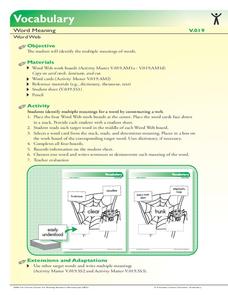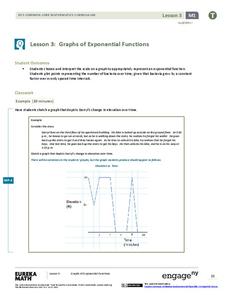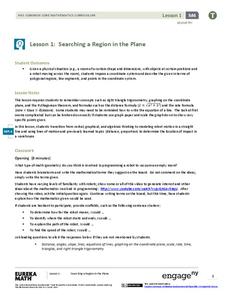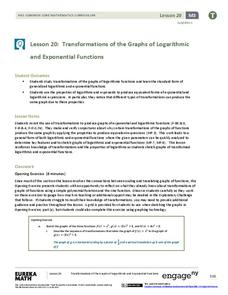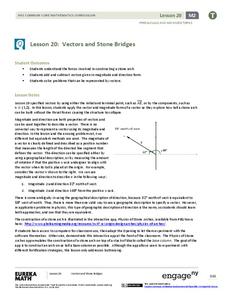EngageNY
Square Roots
Investigate the relationship between irrational roots and a number line with a resource that asks learners to put together a number line using radical intervals rather than integers. A great progression, they build on their understanding...
EngageNY
Slicing a Rectangular Prism with a Plane
What do you get when you slice a prism? Pupils discover that the answer depends on how the prism is sliced. The second half of the 29-part module focuses on three-dimensional objects. Learners use their two-dimensional vocabulary and...
Florida Center for Reading Research
Vocabulary: Word Meaning, Word Web
Explore the multiple meanings of common homographs with this fun language arts activity. Given a series of word webs and a pile of definition cards, pupils complete each web by matching four different definitions to each target word.
The Alamo
The Alamo
Remember the Alamo! Scholars investigate the Battle of San Jacinto during the Texas Revolution. Using models, maps, quotes, biographies, and the Oath of Allegiance, the Alamo comes to life as the stories of those who fought and died in...
EngageNY
Graphs of Exponential Functions
What does an exponential pattern look like in real life? After viewing a video of the population growth of bacteria, learners use the real-life scenario to collect data and graph the result. Their conclusion should be a new type of...
EngageNY
Prove the Pythagorean Theorem Using Similarity
Amaze your classes with the ability to find side lengths of triangles immediately — they'll all want to know your trick! Learners use the Pythagorean Theorem and special right triangle relationships to find missing side lengths.
EngageNY
Searching a Region in the Plane
Programming a robot is a mathematical task! The activity asks learners to examine the process of programming a robot to vacuum a room. They use a coordinate plane to model the room, write equations to represent movement, determine the...
EngageNY
Margin of Error When Estimating a Population Proportion (part 2)
Error does not mean something went wrong! Learners complete a problem from beginning to end using concepts developed throughout the last five lessons. They begin with a set of data, determine a population proportion, analyze their result...
EngageNY
Graphing the Logarithmic Function
Teach collaboration and communication skills in addition to graphing logarithmic functions. Scholars in different groups graph different logarithmic functions by hand using provided coordinate points. These graphs provide the basis for...
EngageNY
Transformations of the Graphs of Logarithmic and Exponential Functions
Transform your lesson plan on transformations. Scholars investigate transformations, with particular emphasis on translations and dilations of the graphs of logarithmic and exponential functions. As part of this investigation, they...
EngageNY
Matrix Notation Encompasses New Transformations!
Class members make a real connection to matrices in the 25th part of a series of 32 by looking at the identity matrix and making the connection to the multiplicative identity in the real numbers. Pupils explore different...
EngageNY
Composition of Linear Transformations 2
Scholars take transformations from the second to the third dimension as they extend their thinking of transformations to include three-dimensional figures. They explore how to use matrices to represent compositions of...
EngageNY
Vectors and Stone Bridges
What does it take to build a stable arch? Pupils apply vectors and physics as they examine arched bridges and their structural integrity. They use vectors to represent the forces acting on the stone sections and make conclusions based on...
EngageNY
Multiplication of Numbers in Exponential Form
Develop a solid understanding of multiplication and division properties of exponents. Individuals expand exponential terms to discover the patterns and create the properties in the second installment in a series of 15. The activity...
EngageNY
Cones and Spheres
Explore methods for finding the volume of different three-dimensional figures. The 20th instructional activity in the 25-part series asks learners to interpret diagrams of 3-D figures and use formulas to determine volume. Scholars must...
EngageNY
Why Worry About Sampling Variability?
Are the means the same or not? Groups create samples from a bag of numbers and calculate the sample means. Using the sample means as an estimate for the population mean, scholars try to determine whether the difference is real or not.
EngageNY
Using Sample Data to Compare the Means of Two or More Populations
Determine whether there is a difference between two grades. Teams generate random samples of two grade levels of individuals. Groups use the mean absolute deviation to determine whether there is a meaningful difference between the...
EngageNY
From Ratio Tables, Equations and Double Number Line Diagrams to Plots on the Coordinate Plane
Represent ratios using a variety of methods. Classmates combine the representations of ratios previously learned with the coordinate plane. Using ratio tables, equations, double number lines, and ordered pairs to represent...
EngageNY
Properties of Inequalities
Class members explore the meaning of inequality by comparing numbers and building number sentences. Using number cubes, pupils find numbers and compare them using inequality symbols. As the activity continues, operations are added to...
EngageNY
Angle Problems and Solving Equations
Learners build connections between algebra and geometry as they study equation solving. The ninth instructional activity in the series of 28 asks pupils to write equations using angle relationships. After writing equations to model...
EngageNY
Using If-Then Moves in Solving Equations
In the eighth activity in a series of 28, math scholars justify the steps of solving algebraic equations. They solve linear equations through an analysis of equality properties, write each equation from a problem situation, and then...
MLC
Fractions Packet
Your fifth graders will appreciate the simple, direct explanations, examples, and practice exercises in this well-organized unit on fractions. Beginning with an introduction to fractions, the packet flows smoothly through the fraction...
Bowland
Olympic Cycling
Teach teenagers to think critically about data. Young data analysts must create two questions that can be answered using a provided data set on Olympic cycling times. Of course, they then have to answer their questions using mathematics.
Curated OER
Using Dictionary Entries
Work on word pronunciations by exploring the dictionary. Learners complete a worksheet containing questions about dictionary entries. They review how to use a dictionary, identify syllable breaks, parts of speech, and word pronunciation.
Other popular searches
- Using Reference Materials
- Word Reference Materials
- Library Reference Materials
- Reference Materials Esl
- Studying Reference Materials
- How to Reference Materials
- Reference Materials Games
- Reading Reference Materials
- Punjabi Reference Materials
- Reference Materials Worksheets
- Internet Reference Material
- On Line Reference Material


